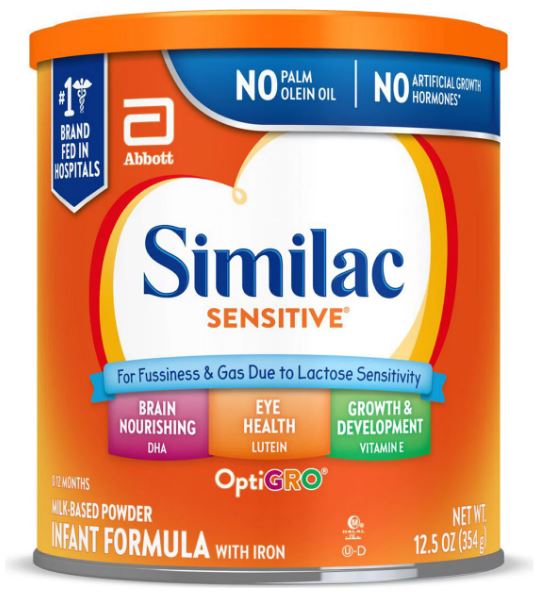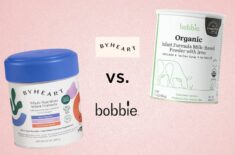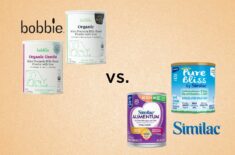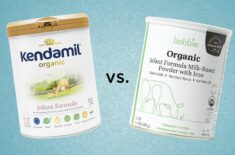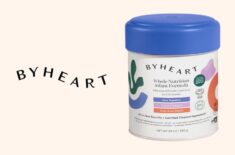Overview
Similac Sensitive and Similac Pro Sensitive infant formulas have gentle formulations and components that may be easy to digest. These formulas can be ideal for fussy babies or those with sensitive stomachs.
Fussiness is fairly common in babies, especially in their first year of life. You might even notice your little one becoming fussy for no apparent reason.
Because they can’t talk, it might be difficult to tell what is causing your baby to act this way. But if your little one appears to be fussier after a meal, it could be due to food sensitivities or intolerance.
You might need to modify your diet if you’re breastfeeding or pick a gentle formula that your baby’s sensitive stomach can easily digest.
Consult with your pediatrician on matters about your child’s digestive health so you can determine whether your child has any of the following:
- Lactose sensitivity
- Lactose intolerance
- Cow’s milk protein allergy
- Galactosemia (inability to digest galactose, a type of sugar in milk)
- Other health issues
Which one is better: Similac Sensitive vs Pro-Sensitive? Can they also provide immune support and other health benefits to your baby? Are these two better than regular formulas? What are their similarities and differences? Learn more below.
Similarities & Differences
Similarities
Similac Sensitive and Similac Pro-Sensitive powdered formulas have nearly identical components:
- These easy-to-digest, milk-based infant formulas are specially designed for sensitive tummies.
- Both formulas have Similac’s OptiGRO, a unique blend of lutein, vitamin E, and the omega-3 fatty acid DHA (docosahexaenoic acid). These are found in breast milk and may support your child’s brain and eye development.
- They can also strengthen your baby’s immune system.
- They’re formulated to provide complete nutrition for babies with fussiness and gas due to lactose sensitivity.
- These are also made for babies with mild spit-up.
- They’re not suitable for infants or children with galactosemia. This rare condition affects the body’s ability to digest galactose (a smaller component of lactose).
- These formulas don’t have artificial growth hormones.
- They don’t have palm olein oil, a common formula component that can lower calcium absorption in your baby’s tummy. (1)
- These two formulas also contain the same concentration of nearly all nutrients, minerals, and vitamins, except inositol.
Both formulas also have the following as ingredients:
- Milk protein isolate
- Corn syrup
- High oleic safflower oil
- Sugar
- Soy oil
- Coconut oil
- Crypthecodinium cohnii oil (source of DHA)
- Mortierella Alpina oil (source of ARA, arachidonic acid)
What Is The Difference Between Similac Pro And Similac Sensitive?
The following differences may help you choose between these two nearly identical Similac formulas:
Why Similac Sensitive Infant Formula Is Better
- Similac Sensitive is slightly cheaper than Similac Pro-Sensitive.
Why Similac Pro-Sensitive Infant Formula Is Better
- This formula has the prebiotic 2’-FL HMO (2’-FL human milk oligosaccharide), the third most abundant component in breast milk. It can help improve your baby’s immune system, cognition, and gut health. (2)
- They both have the same nutrient, mineral, and vitamin content, except for inositol. Similac Pro-Sensitive contains more inositol (24 mg) compared with Similac Sensitive (4.3 mg).
- The formula is also certified to be free from GMOs (genetically modified organisms), believed to have harmful effects on the human body. Consumption of foods with GMOs may cause the development of diseases that are immune to antibiotics. (3)
- There has been no recall for Similac Pro-Sensitive for any health or manufacturing issues.
Similac Sensitive Infant Formula
Best Features & Safety
- It has a special blend of DHA, lutein, and vitamin E called OptiGro that can help support brain and eye development.
- It has nucleotides (important building blocks for nucleic acids) that may help improve metabolic functions.
- It has ARA, a special nutrient that can help improve your baby’s immune system, nervous system, and skeletal muscle.
Is Similac Sensitive good for reflux? This product may ease your baby’s discomfort but it’s not especially designed for reflux.
Age Range
- This formula is made for babies from zero to 12 months old.
Ingredients
This formula has the following ingredients:
- Corn syrup
- Milk protein isolate
- High oleic safflower oil
- Sugar
- Soy oil
- Coconut oil
- Crypthecodinium cohnii oil (for DHA source)
- Mortierella Alpina oil (for ARA source)
- Short-chain fructooligosaccharides
- Lutein
- Nucleotides
- Ferrous sulfate
This milk brand is free from:
- Artificial growth hormones
- Lactose
Nutritional Values
Each serving of this formula (5 fl oz) contains the following nutrients:
- Calories: 100 calories
- Total Fats: 5.4 g
- Total Carbohydrates: 10.9 g
- Proteins: 2.1 g
- Vitamin A: 300 IU
- Vitamin B6: 60 mcg
- Vitamin C: 9 mg
- Vitamin D3: 60 IU
- Vitamin E: 1.5 IU
- Vitamin K: 8 mcg
- Iron: 1.8 mg
- Calcium: 84 mg
- Linoleic acid: 1,000 mg
- Thiamin (vitamin B1): 100 mcg
- Riboflavin (vitamin B2): 150 mcg
- Vitamin B12: 0.25 mcg
- Niacin: 1,050 mcg
- Folic acid: 15 mcg
- Pantothenic acid: 450 mcg
- Biotin: 4.4 mcg
- Choline: 24 mg
- Inositol: 4.3 mg
- Vitamin A: 300 IU
- Phosphorus: 56 mg
- Magnesium: 6 mg
- Zinc: 0.75 mg
- Manganese: 5 mcg
- Copper: 90 mcg
- Iodine: 15 mcg
- Selenium: 2 mcg
- Sodium: 30 mg
- Potassium: 107 mg
- Chloride: 65 mg
Product Recall
In July 2010, Abbott Nutrition (makers of the Similac brand baby formula) recalled up to 5 million units of different powdered infant formulas, including Similac Sensitive with Iron, due to the remote possibility that these products may be contaminated with the small common beetle. (4)
The possible contamination was discovered during an internal quality review at a plant in Sturgis, Michigan. (5)
Several thousand lots/batches of different formulas were affected, most of which differed by just one number or letter. So, Abbott Nutrition was unable to release the recalled lot numbers immediately, spokeswoman Raquel Powers explained. (5)
The following are some of the Similac formulas affected by the recall, all sizes (8-oz, 12.4-oz, 12.9-oz, 23.2-oz, and 34-oz) included: (6)
- Similac Advance
- Similac Early Shield
- Similac Isomil Advance
- Similac Advance Organic
- Similac Sensitive with Iron Powder
- Similac Go & Grow Early Shield
- Similac Go & Grow Early Shield Soy
- Similac Advance Sensitive Powder DHA/AHA
- Similac Sensitive R.S. Powder
- Similac Sensitive Early Shield Powder
The following lots of Similac Sensitive with Iron Powder (23.2 oz) were recalled: (6)
- 75789T200
- 75790T200
- 75837T200
- 75837T201
- 75838T200
- 75882T210
- 75916T200
- 75917T200
- 76019T200
- 76020T200
- 76034T200
- 76049T210
- 76049T220
- 76050T200
- 77083T200
- 77084T200
- 77165T200
- 77166T200
- 77167T200
- 77168T201
- 78177T200
- 78234T200
- 78235T200
- 78299T200
- 78300T200
- 78301T200
- 78301T201
- 78302T200
- 78316T200
- 78317T200
- 79374T200
- 79375T200
- 79381T200
- 79382T200
- 79383T200
- 79417T200
- 79461T201
- 79517T200
- 80623T200
- 80624T200
- 80625T200
- 80626T200
- 80638T200
- 80639T200
- 80640T200
- 81783T200
- 81803T200
- 81805T211
- 82868T200
- 82875T200
- 82876T200
- 83096T200
- 83097T200
- 83098T200
- 83099T200
- 83228T200
- 83229T200
- 83230T200
- 83231T200
- 83232T200
- 84278T200
- 85409T200
- 85410T200
- 85411T200
- 85466T200
- 85467T200
- 85468T200
- 85469T200
- 85527T200
- 85527T201
- 85527T202
- 85528T201
- 85528T202
- 85528T203
- 85529T201
- 85529T202
- 85530T201
- 85530T202
- 86713T200
- 86714T200
- 86715T200
- 86716T200
- 87843T200
- 87844T200
- 87845T200
The recall also included these lots of Similac Sensitive with Iron Powder (8 oz): (6)
- 75882T200
- 76064T200
- 78208T201
- 78208T202
- 78208T203
- 82877T201
- 82877T210
- 82996T200
These lots of Similac Sensitive with Iron Powder (34 oz) were also recalled: (6)
- 76035T200
- 78178T200
- 79462T200
- 80637T200
- 81804T201
- 84279T200
- 85531T201
- 88064T200
According to the recall advisory, these possibly contaminated products have been distributed across the US, Guam, Puerto Rico, and some Caribbean countries. (5)
Affected customers were advised to double-check the bottom of the container if the product was part of the recall. They should stop giving the affected formula to their babies and were instructed to call 1-800-986-8850 to process the refund or product replacement. (5)
Abbott Nutrition clarified that the recalled powdered formulas don’t pose a serious health threat to your baby.(5)
But drinking the affected formulas may cause GI (gastrointestinal) discomfort. Your child might also refuse to eat due to the insect parts possibly irritating the GI tract. (5)
After testing the recalled products, Abbott Nutrition later announced that more than 99.8 percent of the Similac formulas from the Sturgis factory tested negative for the small common beetle contaminant. But they stood by their recall announcement, explaining that it was done as a safety precaution. (5)
Pros
- It doesn’t have palm olein, a compound in palm oil that may affect calcium absorption in your baby’s body. (1)
- It’s slightly cheaper than Similac Pro-Sensitive but can provide your baby with similar nutritional benefits.
Cons
- It’s not organic.
- It has corn syrup and added sugars.
- It doesn’t have prebiotics.
- It’s not certified as a non-GMO formula.
- It has a foamy formulation.
What Customers Say
Positive Reviews
“My son had spit up and gas issues right from the start. We tried the spit formula but then the Doctor had us try sensitive instead and it made a huge difference.” – Reviewer on Similac’s website.
“My baby’s been using this since she was 2 weeks old. We put her on this because she was having a hard time burping. Seem to cause her pain. Put her on this and it all went away helps her stomach a lot.” – Reviewer on Similac’s website.
“If you have a lactose sensitive baby get this. We tried 5 different formulas and this and the pro-sensitive are the only ones that we continued using.” – Reviewer on Amazon.
Negative Reviews
“The sensitive just has too much bubbles… he would have a hard time passing gas and awful tummy aches. Pretty sad when a baby cries out while being fed.” – Reviewer on Walmart.
“I didn’t like that this formula has too much foam and bubble in there after it’s been mixed. Even after I put it in the fridge overnight, the foam doesn’t go away completely.” – Reviewer on Similac’s website.
“Made babies extremely fussy. I have twins that both had much worse gas, gas pains, trouble pooping, and trouble feeding after I started using this.” – Reviewer on Amazon.
Similac Pro-Sensitive Infant Formula


Best Features & Safety
- It contains the prebiotic 2’-FL HMO (2’-FL human milk oligosaccharide), an immune-nourishing component abundant in breast milk.
- It’s certified to be made from non-GMO ingredients.
- It also has OptiGRO (blend of DHA, lutein, and vitamin E) to support your baby’s eye and brain development.
- It also features nucleotides for better metabolic functions.
- This blend also has ARA that can help improve your baby’s immune system, nervous system, and skeletal muscle.
What Is Similac Pro-Sensitive Used For?
This product is used for fussiness and gas due to lactose sensitivity of babies with sensitive tummies.
Age Range: Is Similac Pro Sensitive Safe For Newborns?
- This sensitive formula is made for infants from zero up to 12 months old.
Ingredients
This formula has the following ingredients:
- Corn syrup
- Milk protein isolate
- 2′-fucosyllactose
- High oleic safflower oil
- Sugar
- Soy oil
- Coconut oil
- Crypthecodinium cohnii oil (for DHA)
- Mortierella Alpina oil (for ARA)
- Short-chain fructooligosaccharides
- Lutein
- Nucleotides
- Ferrous sulfate
This milk brand is free from:
- Artificial growth hormones
- Lactose
- GMOs
Nutritional Values
Each serving of this formula (5 fl oz) contains the following nutrients:
- Calories: 100 calories
- Total Fats: 5.4 g
- Total Carbohydrates: 10.9 g
- Proteins: 2.1 g
- Vitamin A: 300 IU
- Vitamin B6: 60 mcg
- Vitamin C: 9 mg
- Vitamin D3: 60 IU
- Vitamin E: 1.5 IU
- Vitamin K: 8 mcg
- Iron: 1.8 mg
- Calcium: 84 mg
- Linoleic acid: 1,000 mg
- Thiamin (vitamin B1): 100 mcg
- Riboflavin (vitamin B2): 150 mcg
- Vitamin B12: 0.25 mcg
- Niacin: 1,050 mcg
- Folic acid: 15 mcg
- Pantothenic acid: 450 mcg
- Biotin: 4.4 mcg
- Choline: 24 mg
- Inositol: 24 mg
- Vitamin A: 300 IU
- Phosphorus: 56 mg
- Magnesium: 6 mg
- Zinc: 0.75 mg
- Manganese: 5 mcg
- Copper: 90 mcg
- Iodine: 15 mcg
- Selenium: 2 mcg
- Sodium: 30 mg
- Potassium: 107 mg
- Chloride: 65 mg
Product Recall
There has been no formula recall for Similac Pro-Sensitive.
Pros
- It doesn’t have palm olein.
Cons
- It’s not organic.
- It has corn syrup.
- It contains added sugars.
- It may cause constipation in some babies.
What Customers Say
Positive Reviews
“Our baby was colicky and used to spit up frequently. But, not any more. After using Similac Pro-Sensitive, she is doing great for the past three months. She never had any problems with digestion or gas after using Pro-sensitive and we continue to use.” – Reviewer on Similac’s website.
“Very easy on the stomach for colic-y babies.” – Reviewer on Target.
“This formula works great for my son who has a sensitive stomach.” – Reviewer on Amazon.
Negative Reviews
“The newborn became too fussy and gassy and non-stoppable crying after each feed, most probable due to colic tummy.” – Reviewer on Amazon.
“I could not breastfeed for a couple of days and my 4 week baby got extremely constipated with this. She has been so fussy and unable to sleep.” – Reviewer on Similac’s website.
“After using this for a week, our son would sleep for 3 hours after the formula, then nurse, and every night around 4am he would wake up with horrible gas, pains, and constipation until about 8am and we would even give him gas drops with his nursing session to help avoid the issue for our poor baby.” – Reviewer on Target.
Summary & Recommendation
Similac Pro-Sensitive and Similac Sensitive are two of the many gentle formulations offered by the infant formula brand.
Both can provide complete nutrition for your baby and have more than the FDA’s minimum iron requirement of 1 mg per 100 calories. So, you might not need additional supplements to support your baby’s growth.
But if you have to choose between these two formulas, here are our recommendations:
Choose Similac Sensitive if:
- You prefer a formula with better value for your money. Similac Sensitive is slightly cheaper than Similac Pro-Sensitive.
- You don’t mind a formula with slightly fewer components and no prebiotics.
Choose Similac Pro-Sensitive if:
- You don’t really mind the slightly higher price tag.
- You want a formula with prebiotics (2’-FL HMO).
- You prefer a formula with more inositol, a milk component that can help improve your baby’s cognitive development. Similac Pro-Sensitive contains more inositol (24 mg) compared with Similac Sensitive (4.3 mg).
Ready-To-Feed Liquid Formulas: Similac Sensitive Vs Pro-Sensitive
Similac Sensitive Ready-To-Feed Liquid Formula
Similac Pro-Sensitive Ready-To-Feed Liquid Formula


- Both Similac Sensitive and Similac Pro-Sensitive are available in ready-to-feed liquid formulas.
- Both have formulations similar to their powder counterparts.
Baby Formula FAQs
What Factors Must I Consider In Choosing A Sensitive Formula?
- Lactose-free formulas
- Reduced lactose formulas
- Probiotics
- Hypoallergenic
- Dairy-free
- Texture and thickness
- Components that resemble breast milk
- Nutrients for brain development (DHA and ARA)
- Minimum requirements (should meet FDA minimum for iron and other nutrients)
- Safety concerns (no recent formula recall)
Can I Mix Different Formulas For My Baby?
Yes, it’s possible to mix different formulas as long as your baby doesn’t have sensitivities to any of these formulas’ components.
Is Goat Formula Safe For Babies?
Yes, goat formula can be a safe alternative to cow’s milk for infants. But it’s still a dairy milk source and may contain lactose.
Does A Sensitive Formula Require Special Preparation?
No. While the formulation or content is different from regular formulas, these sensitive formulas are prepared similarly.
Will It Matter If My Formula Is Organic Or Not?
We recommend organic formulas because they may have safer ingredients that are free from toxic chemicals such as pesticides, herbicides, and fungicides.
Is Corn Syrup In Baby Formula Harmful?
The corn syrup used in baby formula is different from the high-fructose corn syrup used in sugary drinks and commercial foods.
But some parents prefer to avoid formulas that use corn syrup as a replacement for lactose.
What Are The Common Symptoms Of Lactose-Intolerance?
Lactose intolerance is rarely life-threatening but can still cause great discomfort to your little one.
The following are common symptoms that your baby might experience after taking food or formula with lactose: (7)
- Frequent crying
- Diarrhea or loose stools
- Nausea
- Vomiting
- Fussiness
- Stomach cramps
- Bloating
- Gas or flatulence
What Signs Show That My Baby Needs To Try A Different Formula?
The following are some of the signs that your child may have to try a different formula:
- Frequently rejects the formula or doesn’t finish a bottle
- Cries a lot even with regular and frequent feedings
- Spits up a lot
- Streaks of blood in the stool
If your child becomes lethargic or shows breathing difficulties, immediately seek medical attention because these can be signs of a severe allergic reaction. It may be life-threatening.
Are Ready-Made Formulas Better Than Powder?
It depends on your preference.
In general, ready-made liquid formulas have the same formulation as their powder counterparts but can be more expensive. Some parents prefer liquid formulas because they are more convenient, especially if you’re on the go.
REFERENCES
(1) https://pubmed.ncbi.nlm.nih.gov/8780336/
(2) https://www.ncbi.nlm.nih.gov/pmc/articles/PMC6213476/
(3) https://www.ncbi.nlm.nih.gov/pmc/articles/PMC3791249/
(4) https://buffalonews.com/news/similac-recalls-powdered-formula/article_a7d6e134-56bc-56c7-b29d-11edd4093b1e.html
(5) https://www.cleveland.com/business/2010/09/similac_recall_check_here_to_s.html
(6) https://www.cbsnews.com/htdocs/pdf/SimilacLotList.pdf
(7) https://www.mayoclinic.org/diseases-conditions/lactose-intolerance/symptoms-causes/syc-20374232



